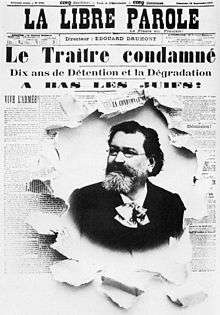Édouard Drumont
Édouard Adolphe Drumont (3 May 1844 – 5 February 1917) was a French journalist and writer. He initiated the Antisemitic League of France in 1889, and was the founder and editor of the newspaper La Libre Parole. After spending years of research, he synthesised three major types of antisemitism. The first type was traditional Catholic attitudes toward the alien "Christ killers" augmented by vehement antipathy toward the French Revolution. The second type was hostility toward capitalism. The third type was so-called scientific racism, based on the argument that races have fixed characteristics, and asserting that Jews have negative characteristics.[2] Drumont's biographer, Grégoire Kauffmann, places Drumont within the counter-revolutionary tradition of Louis Veuillot, Antoine Blanc de Saint-Bonnet, and anti-modern Catholicism.[3] Socialist leader Jean Jaurès stated that "all the ideas and arguments of Drumont were taken from certain clerical opponents of the French Revolution.[4]

Early life
Drumont was born in Paris in 1844 to a family of porcelain-painters from Lille. He lost his father at the age of seventeen, and had to care for himself and earn his own livelihood from then onwards.[5]
Public career
He first worked in government service, and later became a contributor to the press and was the author of a number of works, of which Mon vieux Paris (1879) was awarded by the French Academy. He also worked for Louis Veuillot's L'Univers.[6]
Drumont's 1886 book, La France juive (Jewish France), attacked the role of Jews in France and argued for their exclusion from society. In 1892, Drumont initiated the newspaper the La Libre Parole which became known for intense antisemitism. Gaston Méry was soon made editor in chief due to his skill in exploiting scandalous affairs and his daring invective. The newspaper took "France for the French" as its motto.[7] The newspaper was sceptical of Léo Taxil's anti-Catholic Diana Vaughan hoax before Taxil admitted it in 1897.
For the French legislative election of May 1898, the antisemitic activist Max Régis endorsed Drumont before this election from Algiers.[8] On 8 May 1898, Édouard Drumont was elected triumphantly with 11,557 votes against 2,328 and 1,741 for his opponents.[9] Of six Algerian national deputies, four were elected on the platform of Regis's Anti-Jewish League.[10] Drumont represented Algiers in the Chamber of Deputies from 1898 to 1902. He was sued for accusing a parliamentary deputy of having accepted a bribe from the wealthy Jewish banker Édouard Alphonse de Rothschild to pass a piece of legislation the banker wanted.
Drumont had many devotees.[11] He exploited the Panama Company scandal[12] and reached the maximum of his notoriety during the Dreyfus Affair, in which he was the most strident of Alfred Dreyfus' accusers.[5]
For his anti-Panama articles, Drumont was condemned to three months' imprisonment. In 1893, he was an unsuccessful candidate for the representation of Amiens; the next year he retired to Brussels. The Dreyfus affair helped him to regain popularity, and in 1898, he returned to France and was elected deputy for the first division of Algiers, but was defeated as a candidate for re-election in April–May 1902.[5]
Works
- La fin d'un monde (1888)
- Dernière battaille (1890)
- Testament d'un antisémite (1891)
- Secret de fourmies (1892)
- De l'or, de la boue, du sang – Du Panama á l'anarchie (1896), dealing with the Panama scandals
- Les Juifs et l'affaire Dreyfus (1899)
- Vieux portraits, vieux cadres (1900)
La France juive
La France juive (Jewish France) (1886)
See also
- Panama scandals
- Dreyfus Affair
- Jules Guérin
- Henry Coston
References
- the day after Alfred Dreyfus had been convicted again on 9 September 1899 in Rennes
- Richard S. Levy, Antisemitism: A historical encyclopedia of prejudice and persecution (2005) 1:191
- Kauffmann, Grégoire (2008). Édouard Drumont. Perrin. p. 425.
- Hay, Malcolm (2005). Europe and the Jews: The Pressure of Christendom on the People of Israel for 1,900 Years. Chicago Review Press.
- Deutsch, Gotthard, and A.M. Friedenberg. "DRUMONT, EDOUARD ADOLPHE, JewishEncyclopedia.com (accessed 9 November 2007).
- Arnoulin, Stephane (1902). M. Edouard Drumont et les Jesuites. Librairie des Deux-Mondes. pp. 73–75.
- Seillan, Jean-Marie (2003), "Nord contre Sud. Visages de l'antiméridionalisme dans la littérature française de la fin du XIXe siècle", Loxias (in French), 1, retrieved 13 December 2017
- Benbassa 2001, p. 145.
- Bouveresse 2008, p. 492.
- Zack 2005, p. 594.
- Drumont's Jewish disciple, 2 June 2008
- Arendt, Hannah. The Origins of Totalitarianism. Harvest Books, 1973; ISBN 0-15-670153-7, pp. 95-99.
Sources
- Benbassa, Esther (2 July 2001), The Jews of France: A History from Antiquity to the Present, Princeton University Press, ISBN 1-4008-2314-5, retrieved 7 February 2016
- Bouveresse, Jacques (2008), Un parlement colonial: les délégations financières algériennes, 1898-1945 (in French), Publication Univ Rouen Havre, ISBN 978-2-87775-876-5, retrieved 7 February 2016
- Zack, Lizabeth (2005), "Regis, Max (1873-1950)", Antisemitism: A Historical Encyclopedia of Prejudice and Persecution, ABC-CLIO, ISBN 978-1-85109-439-4, retrieved 7 February 2016
Further reading
- Anderson, Thomas P. "Edouard Drumont and the Origins of Modern Anti-Semitism." Catholic Historical Review (1967): 28-42. in JSTOR
- Busi, Frederick. The pope of antisemitism: the career and legacy of Edouard-Adolphe Drumont (University Press of America, 1986)
- Byrnes, R. F. "Edouard Drumont and La France Juive." Jewish Social Studies (1948): 165-184. in JSTOR
- Isser, Natalie. Antisemitism during the French Second Empire (1991) online
- Antonio Areddu, Vita e morte del marchese di Mores Antoine Manca (1858-1896), Cagliari, Condaghes, 2018